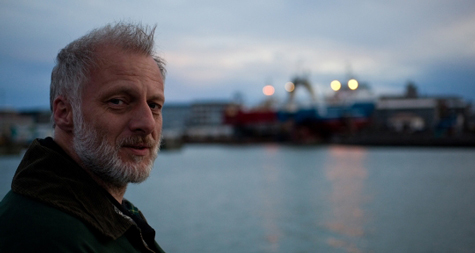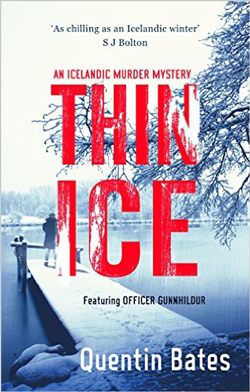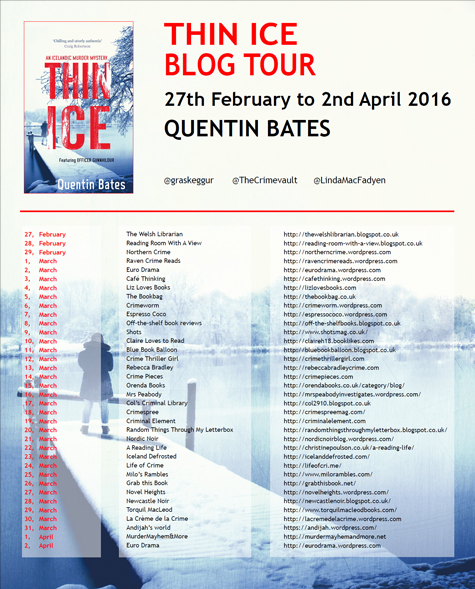
This original blog post by author Quentin Bates is part 1 of a 2 part series including an exclusive Q&A featuring questions from YOU, the readers. To win a copy of Quentin's new book Thin Ice, make sure you're signed in, and ask the author a question in the comments section below. We'll choose the best questions to be included in the forthcoming Q&A, and those users will also win a copy of Thin Ice!
Any crime story set in Iceland is always going to be a locked room mystery to a greater or lesser extent.
It’s an island with a population of 330,000 people, equivalent to somewhere like Croydon or Bielefeld, although with rather more jagged scenery and less predictable weather. Those 330,000 people are the entire population of this little country, and around half of them live in the southwest corner, either in the Reykjavík region or within commuting distance of it.
Iceland’s a long way from anywhere. You don’t get the feeling of isolation when you’re there—especially when you’re in a buzzing, cosmopolitan place like Reykjavík’s 101 district—but it can hit you when you venture past the city limits and into the countryside, where it’s not wise to pass a petrol station without filling up. The next one could be a long way down the road.
In case you’re wondering why Iceland, it’s a personal thing. My own links with Iceland go back a very long way. I spent ten years going native by the north coast, so Iceland has left some indelible marks. I go back whenever I can, for a few days or a few weeks, to soak up the atmosphere and take the temperature of my other home.
When it came to writing fiction, I have to admit that I shied away from using Iceland as a backdrop to begin with, but eventually realised that not using all that insight and background knowledge would be a colossal waste, so Iceland became the backdrop to the series of novels.
For a crime writer, Iceland is a gift in many ways. It’s a peaceful place. There isn’t much crime. There are no bank robbers. Let me rephrase that—there have been bank robbers, but they’re the variety that wear suits and carry briefcases. Let’s say there’s little noticeable crime. There are plenty of possibilities, but also a few drawbacks, and one of the problems is how to get away with a crime.
You can’t rob a bank in Iceland in the time-honoured manner with a mask and a sawn-off shotgun, because there’s little point. Let’s suppose a hypothetical bank robber makes a getaway with a bagful of money. What does he do with it?
If he spends any of it, he’ll find the neighbours noticing the new car or the extension to his house, and there are only so many foreign holidays you can take.
If all those ill-gotten gains are in thick wads of Icelandic krónur, he can’t change them into anything more easily acceptable elsewhere in the world—for just the same reason that he can’t deposit them in a bank account. Somebody’s going to notice, and if it’s not his neighbours, someone at the bank is going to put two and two together and ask awkward questions.
The underworld would undoubtedly take a decent pile of the cash in return for his drug of choice, or even change a stack of it in exchange for dollars or euros, presumably against a prohibitively lousy exchange rate. So not only does a villain have to figure out how to get away with a crime, he’ll have to work out how to turn the proceeds into something useful.
Of course, it would help to have access to the bank’s inner workings, but some (not all) of the smart guys who did rob banks from the inside are now doing time in a rather luxurious prison in the west of Iceland, eight years after the financial crash.
Another headache for a crime writer in Iceland is that it’s impossible to disappear. In a country of a third of a million people, it’s not feasible to move to a new town and start quietly from scratch with a new identity. These days, that’s difficult enough in a big, busy country. But in Iceland, it just couldn’t be done. Wherever you decide to settle, there’s always going to be someone who was at school with your sister, used to be married to your cousin, or remembered working with your uncle—and Icelanders are curious about who newcomers are.
“Who are your people?” is a question our fugitive would be asked sooner rather than later, and there’s no point trying to fudge the answer because the amateur genealogists will figure out quickly enough that his third cousin works in the local shop.
So our villain has to get out of the country, having first surmounted the problem of turning his ill-gotten gains into dollars or euros. How do you leave the country without being noticed—assuming our fugitive is on the authorities’ radar?
There’s only one international airport. That’s the one at Keflavík, a forty-minute drive from Reykjavík. There’s one ferry that sails to Hirtshals in Denmark. So it’s either the airport at Keflavík or the ferry port at Seydisfjördur, and if our fugitive is being looked for, those two places are going to be under a microscope.
There are freighters, cruise ships, the occasional visiting trawler from Greenland or Russia—none of which would be simple options, and stowing away would hardly be any better. There are some private aircrafts, a few flights from other airports around the country during the summer when the tourist season is at its peak, but that’s about it. Any escape would have to be very quick, before the hue and cry starts, and via one of those two bottlenecks.
 Thin Ice includes strands of plot that take in many of these problems. The two villains at the center of it thought they had their crime perfectly planned. They rob a local kingpin of his stash of foreign currency and plan to head straight for the airport and away before there’s a chance of being caught—it’s not as if another criminal is going to report them to the police.
Thin Ice includes strands of plot that take in many of these problems. The two villains at the center of it thought they had their crime perfectly planned. They rob a local kingpin of his stash of foreign currency and plan to head straight for the airport and away before there’s a chance of being caught—it’s not as if another criminal is going to report them to the police.
They reckon it’s the perfect crime, and it is, right up to the moment things go wrong. That’s when they find themselves on the run from both the police and the criminal fraternity—and being collared by the police would probably be the less painful choice. Having to avoid both the law and the underworld stacks the odds against them to an alarming level. Their best option would undoubtedly have been to give themselves up and say sorry—but that wouldn’t be much of a story.
Can they beat the odds get away with it? Or do Gunnhildur Gísladóttir, the heroine of the series, and her team of detectives manage to find the hapless criminals and the two women they carjacked during their botched escape before the victim of their robbery does?
You’ll have to read Thin Ice to find out how they cope, and how they manage to escape (or not) from the locked room that is Iceland.
Remember to ask the author a question in the comments below for a chance to be featured in the forthcoming Q&A and to win a copy of Thin Ice by Quentin Bates.
To enter, make sure you're a registered member of the site and simply ask a question below.
TIP: Since only questions from registered users will be evaluated, if your user name appears in red above your comment—STOP—go log in, then try asking again. If your user name appears in black above your question, You’re In!
Thin Ice Q&A: NO PURCHASE NECESSARY TO ENTER OR WIN. A purchase does not improve your chances of winning. Open to legal residents of 50 United States, D.C., and Canada (excluding Quebec), who are 18 years or older as of the date of entry. To enter, complete the “Post a Comment” entry at www.criminalelement.com/blogs/2016/03/iceland-a-locked-room-mystery-on-a-grand-scale-quentin-bates-thin-ice-blog-tour-q-and-a beginning at 12:00 p.m. Eastern Time (ET) March 19, 2016. Ends 11:59 a.m. ET March 29, 2016. Void outside the United States and Canada and where prohibited by law. Please see full details and official rules here. Sponsor: Macmillan, 175 Fifth Ave., New York, NY 10010.

To learn more or order a copy, visit:
Quentin Bates was born in England and through a series of coincidences found himself working in Iceland for his gap year. One year turned into ten, plus a wife and children. After ten years writing on the sea and a move back to the UK, Quentin took to dry land and began work as a nautical journalist and editor of a commercial fishing magazine. He lives in Hampshire with his wife and three children. The Gunnhildur Gisladottir series was born through the author's own inside knowledge of Iceland and its society, along with exploring the world of crime.

Did you know the ending before you began the book or just let it work out organically?
I thought I knew what the ending would be. But when it came to writing the last fifty pages, things didn’t go quite as I had expected.
Do any of the characters share characteristics with anyone you know?
As a photographer I find myself endlessly drawn to the beautiful landscapes of Iceland, both natural and with manmade components. What part, if any, do the scenery and landscapes of Iceland play in your writing: setting, plot, inspiration, etc?
Alidottir, alongside the copyright info the standard disclaimer says ‘any resemblance to persons living or dead is purely coincidental.’ But there might well be a few coincidences there…
thedelfrog, landscape is part of the mix, and probably more in this book than in the previous ones that have a more urban setting. But I find weather more important than landscape, and weather in Iceland can change half a dozen times in a day. Whatever scene I’m writing, I have to have at the back of my mind an idea of whether it’s raining, snowing, foggy, hot/cold, sunshine, etc.
Where do you get your best ideas and how?
Why did you choose Iceland as the setting?
ANY NEW BOOKS WITH ICELAND AS A BACK GROUND COMING IN THE NEAR FUTURE??
Do you read any of the other well-known Icelandic mystery novelists? Yrsa , for example.
Since you say that everyone pretty much knows everyone else in Iceland, did you use real Icelanders’ names for your characters or simply make them up hoping you aren’t offending anyone with that same name?
How long did it take you to write the book?
Is there anything that’s true or happens in Iceland that you had to rewrite to fit your book? If so, what was it?
Did you take into account the large percentage of people who own guns in Iceland in writing your novel?
Did you read any Icelandic authors to get an idea?
The cover of your book is outstanding! Just looking at it makes me want to open it and commence reading. Did you design it?
Mr. Bates, I’ve not yet read any of your works, but this novel sounds compelling. I can’t wait to settle in and read.!
Did you reside in Iceland when you were writing?
Have prominent is the underworld in Iceland?
sounds great sign me up
What is your favorite food?
Good deal, count me in!
Is there much petty crime against tourists who visit?
Fascinating premise – what do Icelandic low-lifes do, then?